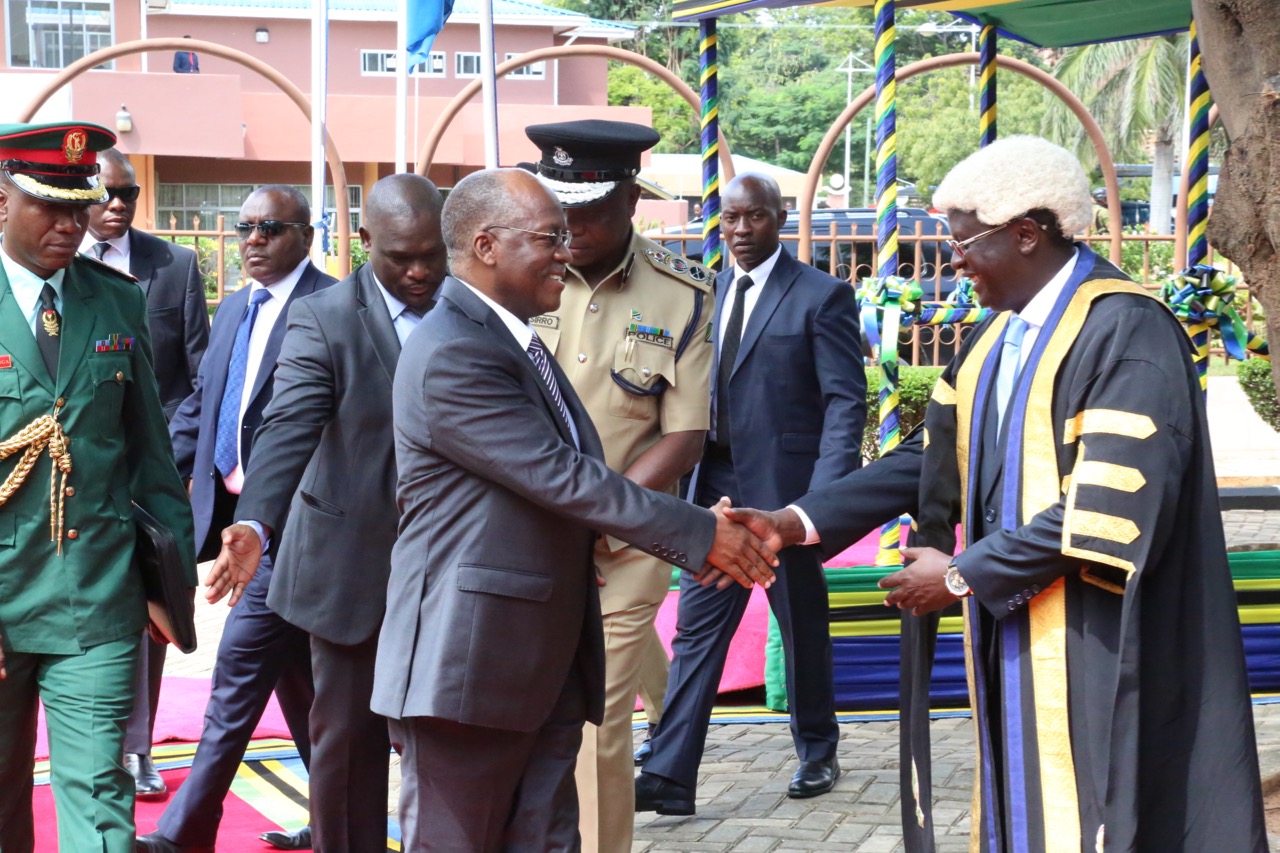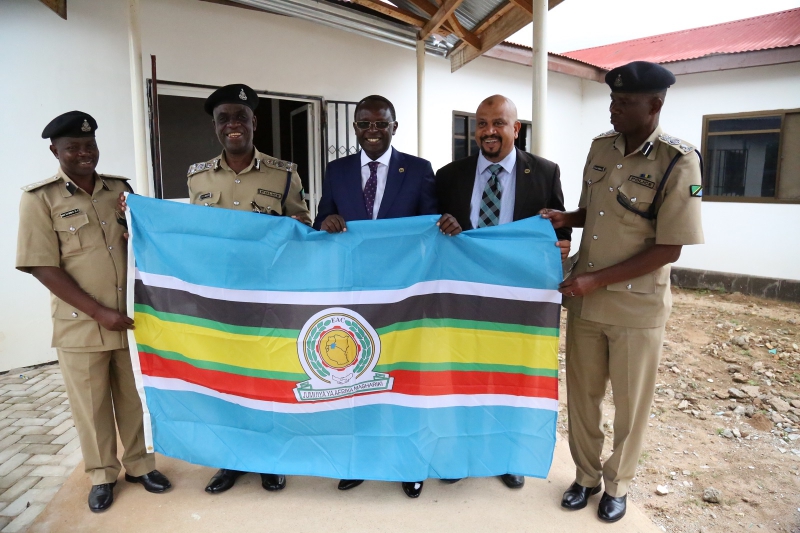
President Magufuli Addresses EALA
…rallies for industrialization and home-grown solutions as key to region’s development
East African Legislative Assembly, Dodoma, Tanzania: April 24th 2018:
The President of United Republic of Tanzania, H.E. Dr John Pombe Joseph Magufuli this afternoon addressed the 4th Meeting of the 1st Session of EALA.
In his remarks, President John Pombe Joseph Magufuli rallied for the industrialization and infrastructural development of the region – saying it held the key for the transformation of the United Republic of Tanzania and the entire region.
The President said time had come for the region to “think big and beyond parochial issues” and urged the regional Assembly to take a central role in ensuring the full integration and development of the EAC was realized.
President Magufuli who addressed the House in flawless Kiswahili, reiterated his remarks by saying the region was resource rich but that the citizens were yet to benefit from the same and called for removal of barriers, injustices, imminent suspicions and fears of the region. “Let me take the opportunity to make the clarion call to EALA today to rise up to the occasion and be a people’s Assembly that is truly-centred on addressing their problems”, President Magufuli said.
The President further reiterated his country’s commitment to the EAC. “We are totally and fully behind the integration process and we shall fast-track decisions we take for the benefit of the regions”, he remarked.
The President said the EAC must add value to its raw materials. “Look at the Republic of South Sudan, it has loads of Oil. United Republic of Tanzania on its part, has various natural resources, including livestock, forests and minerals among others. We as a region are rich – but we do not feel the trickle-down effect. Why? he pondered! The region should add value by processing raw materials to the end in order to create employment and build stronger, efficient and better economies”, he said.
“Let us seek self-introspection so as to transform the region. Mr Speaker, the EALA is capable of taking the lead here for a win-win situation that will benefit the region. My Government is committed to enhancing industrialization in order to encourage regional investors to invest right here in Tanzania. We need to protect our home industries and tap in to the same for the benefit of the region which has over 170 Million citizens”, he added.
The President further cited infrastructural developments and the revitalization of the energy sector as key ingredients to speeding transformation. “The cost of transport and energy is too high”, lamented President Magufuli, resulting in situations where the costs of travel had scaled up almost four times in comparison to other regions.
According to findings by Power Africa in 2015 results show the region only has 6500MW which cannot entirely support the region’s development. In that regard, the President called for other alternatives to be sought.
“We must reverse the trend and assist the region. I challenge you Mr Speaker and Members to see what you can do. He remarked that natural gas and the rare helium gas were available in Tanzania and said such benefits should for example be spread across the entire region. The President said the alternative energy initiatives would assist boost the national grid adding an additional 2100 MW which would be sold in the region. “As Tanzania, we shall do our part,” he said.
The President hailed and acknowledged the Speaker and Members for making it possible for him to deliver his inaugural speech to the House. “I thank the Speaker for the decision to bring the meeting to Dodoma for the very first time and noted the idea of the rotational principle by EALA would go a long way in creating awareness of the citizens. I welcome you to Dodoma and wish you well, the citizens here are very hospitable,” he remarked.
The President pledged support to the Speaker and the EALA Members and assured them of his unreserved support. The President however remarked that the Assembly was the voice of the citizens of the region at a time when the region was facing progress and surmountable challenges.
The President remarked the region was on the verge of removing all Non-Tariff Barriers to further boost volume of trade. He said the progress in the region included the expansion of Membership (EAC) and called for strengthening of the integration process further. In the regard, President Magufuli appreciated the decision of the House to debate on the East African Monetary Institute Bill, 2017 acknowledging its contribution to the quest for the single currency. The President also acknowledged the decision by the Assembly to visit the Northern and Central corridors, for which the House had already debated.
President Magufuli remarked the region should resolve the conflicts stalling the integration process and implored EALA to contribute to the solutions. “I urge you to critically look into the existing challenges and address the same.
The President rallied for commonalities and unity as exhibited by the Summit and the top echelons of the region. “We need to get to a point where there is unity and oneness. I am impressed by the sitting arrangements in the Assembly today which is devoid of groupings in nationalities” he said. “But this must transcend to the rest of the citizenry,’ he added. The Head of State rallied for unity and remarked that Kiswahili must be appreciated at all times in addition to the local dialects which cut across the region.
The President said Tanzania was equal to the task of completing the expansion of Dar Port and the Standard Gauge Railway (SGR) which he stated, would link Tanzania to Burundi and Rwanda as well as to the DRC and Uganda. The country is also looking at the renovation of its maritime and especially the boat infrastructure in the Lake Zone. Let us be project-oriented and seek home grown solutions for the same.
The conditionalities for development partners may not always be suitable. We can do this ourselves”, he said in reference to the 700.2 Km link of Dodoma to Dar at the cost of 700 Trillion without any development support. “Neither did we receive loans for the purchase of the new airlines. It is thus possible,” President Magufuli stated. The President further cited his country’s uptake of the e-international passport and the ratification of the Peace and Security protocol as true reflection of Tanzania’s commitment to decisions by the bloc
In attendance were key government officials led by the Prime Minister of the United Republic of Tanzania, Rt Hon Majaliwa Kassim Majaliwa, senior officials of Government, Legislators of the Parliament of Tanzania, Dodoma elders, religious leaders and Members of the Diplomatic corps among others.
In his welcome remarks, the Speaker of the EALA, Rt. Hon Ngoga Karoli Martin, noted that the Sitting was taking place at an irreversible time in the regional integration process.
The Speaker remarked that EALA was fully supportive of the call to expedite the establishment of the EAC Monetary Institute and other related institutions as a precursor to the harmonisation of the fiscal and monetary policies revolving around the establishment of the eventual single currency.
“We shall keep forward on our role, of providing the legal framework through legislation and representation to enable operationalization of areas of co-operation agreed upon by our Partner States” Rt Hon Ngoga added.
The Speaker further called for the speedy amendment of the Treaty for the Establishment of the EAC saying a number of areas needed to be refined or re-defined, to strengthen the incremental approach towards deeper integration.
He reiterated the need to fully incorporate Kiswahili as one of the official languages of the EAC resulting from amendment of the said Treaty.
The Speaker hailed the progress made by the United Republic of Tanzania since H.E Dr Magufuli assumed leadership saying the commissioning of the 1445 km long East African Crude Pipeline from Hoima District in Uganda to the Tanga port in Dar, simply defines the business of the EAC.
“True to your leadership philosophy that prioritizes hard-work and getting things done with emphasis on value for money, in just a few months since its launch, construction of the first phase from Dar Es Salaam to Morogoro is already completed with the second phase of Morogoro-Dodoma section underway.
Rt Hon Ngoga lauded H.E. the President for his steadfast commitment in the fight against corruption. “Yours is a fight for transformation. It is a fight that requires tenacity and resilience. You are the leader with these qualities, determination and ability to lead through challenges and the region is proud of you”, the Speaker said.
Youthful legislator, Hon Dennis Namara passed the vote of thanks on behalf of the Assembly.
EALA which commenced two weeks ago, has since undertaken the following notable business:
- Passed the EAC Oaths Bill, 2018
- Passed the report of the EAC Central and Northern corridors, institutions Projects and programmes
- Various Committees were convened and pertinent matters of the region discussed before they are deliberated in the House.
- Undertook an outreach activity at the University of Dodoma, reaching out to students and communities. The Assembly further engaged in an environmental conservation planting close to 1000 trees within Dodoma vicinity.
- Undertook representation activities meeting with various stakeholders.
The formal Parliamentary Session is expected to conclude tomorrow (April 25th, 2018). On April 26th, 2018, EALA Members will join the Government and citizens of the United Republic of Tanzania in commemorating the 54th Union Day celebrations at the Jamhuri Stadium.
- ENDS -
For more information, please contact:
Bobi Odiko
Senior Public Relations Officer
East African Legislative Assembly
Arusha, Tanzania
Tel: +255-27-2508240
Fax: +255-27-2503103
Cell: +255-787-870945, +254-733-718036
Email: BOdiko [at] eachq.org
Web: www.eala.org
About the East African Legislative Assembly:
The East African Legislative Assembly (EALA) is the Legislative Organ of the Community and has a cardinal function to further EAC objectives, through its Legislative, Representative and Oversight mandate. It was established under Article 9 of the Treaty for the Establishment of the East African Community.

